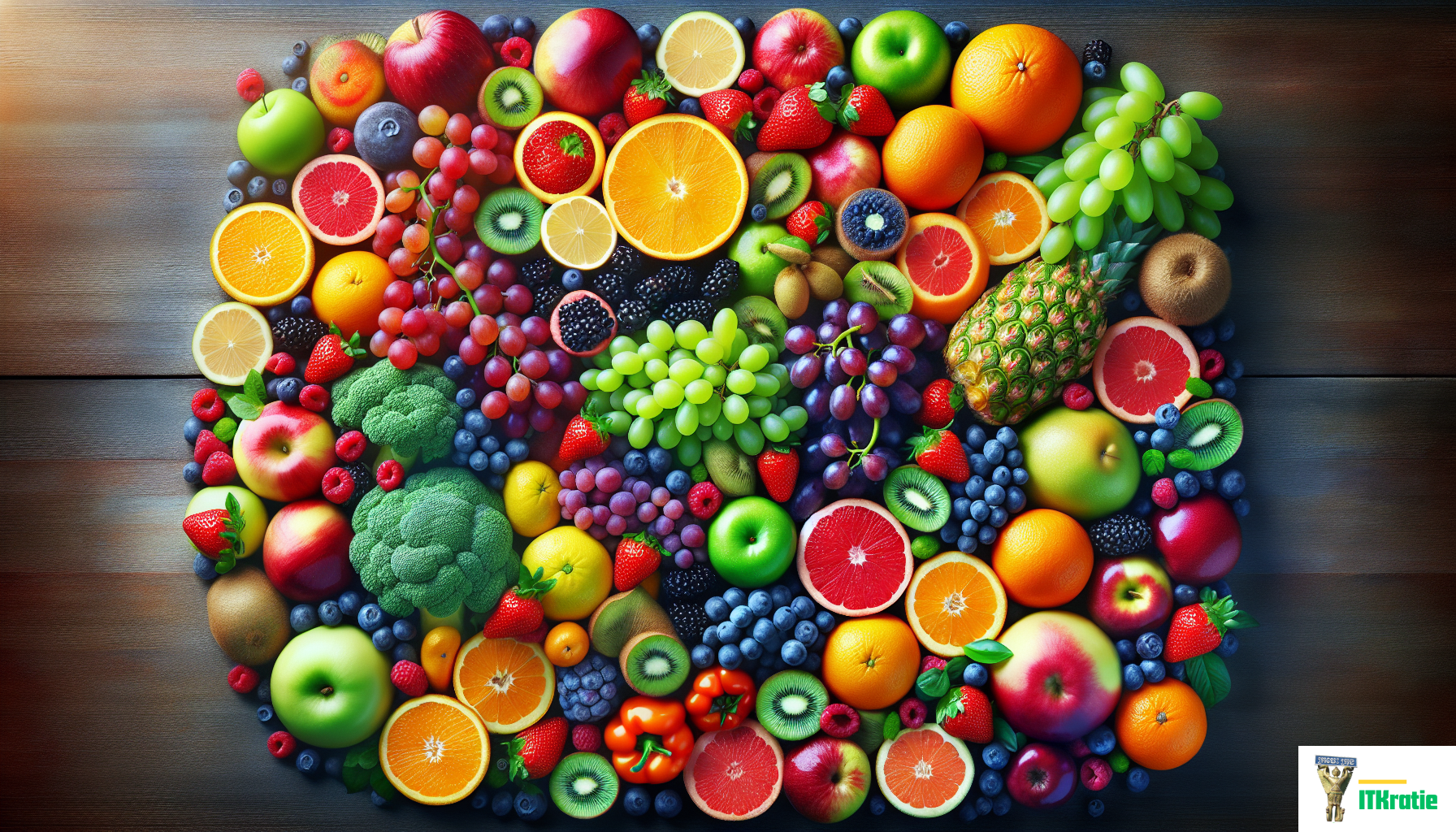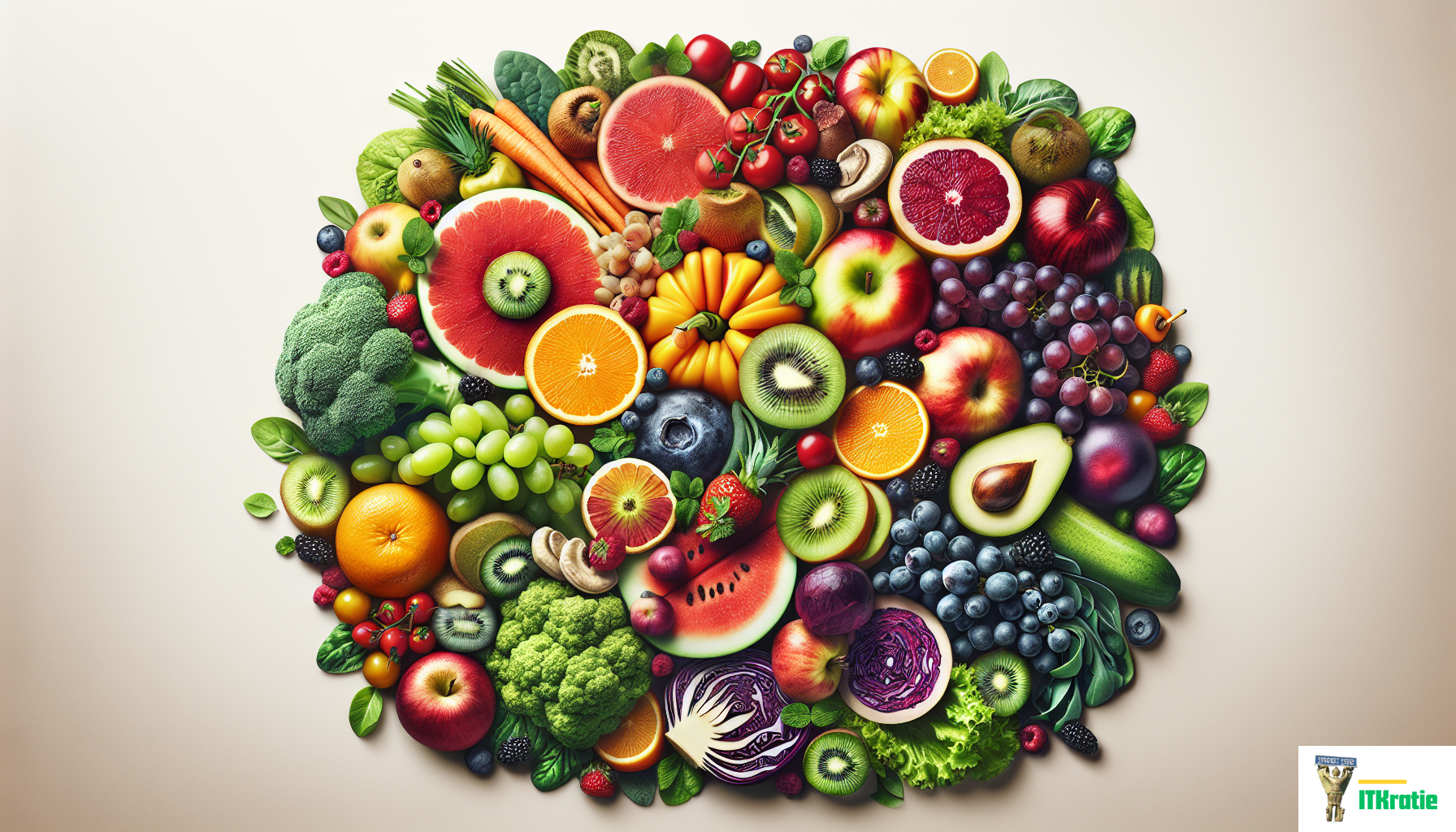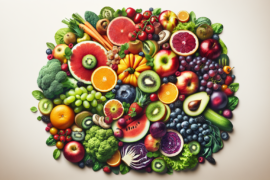Are you tired of following fad diets and constantly wondering what is truly healthy for your body? Look no further! In this article, we are going to explore the ten good food habits that will not only nourish your body but also promote overall well-being. These habits encompass everything from portion control to mindful eating, giving you the tools you need to make positive changes in your diet. Say goodbye to confusing meal plans and hello to a healthier lifestyle!
Eating a Balanced Diet
Eating a balanced diet is essential for maintaining good health and well-being. It is important to include a variety of food groups in your meals to provide your body with the necessary nutrients it needs. A balanced diet consists of fruits, vegetables, whole grains, lean proteins, and healthy fats. By incorporating these food groups into your meals, you can ensure that you are getting a wide range of vitamins, minerals, and antioxidants that are necessary for optimal health.
Include a variety of food groups
Including a variety of food groups in your diet is crucial to ensure that you are getting all the essential nutrients your body needs. Fruits and vegetables provide important vitamins, minerals, and fiber. Whole grains are a great source of complex carbohydrates that provide sustained energy. Lean proteins, such as chicken, fish, eggs, and tofu, are necessary for muscle repair and growth. Healthy fats, like avocados and nuts, provide essential fatty acids to support brain function and overall health.
Portion control
While it is important to include a variety of food groups in your diet, portion control is equally important. Paying attention to portion sizes can help prevent overeating and maintain a healthy weight. Use visual cues, such as the size of your palm or a deck of cards, to estimate appropriate portion sizes for proteins and grains. Fill half of your plate with fruits and vegetables, and be mindful of adding healthy fats in moderation. Moderation is key when it comes to maintaining a balanced diet and ensuring that you are consuming the right amount of nutrients.
Limit processed and sugary foods
Processed foods, such as fast food, packaged snacks, and sugary drinks, should be limited in your diet. These foods are often high in unhealthy fats, added sugars, and sodium, which can contribute to weight gain, heart disease, and other health issues. Instead, opt for whole, unprocessed foods that are nutrient-dense and provide lasting energy. Minimize your intake of sugary foods and drinks, as they can lead to weight gain and increase the risk of conditions such as diabetes and tooth decay. Replacing processed and sugary foods with healthier alternatives can greatly improve your overall health and well-being.
Drinking Plenty of Water
Drinking plenty of water is essential for maintaining proper hydration and supporting various bodily functions. Water is involved in digestion, absorption, and transport of nutrients, as well as the regulation of body temperature and removal of waste products.
Importance of hydration
Staying hydrated is crucial for overall health. Water makes up a significant portion of our body, and without enough water, dehydration can occur, leading to fatigue, headaches, constipation, and difficulty concentrating. It is important to drink enough water throughout the day to replenish the fluids lost through sweating, urination, and breathing.
Benefits of drinking water
Drinking an adequate amount of water has numerous benefits for our bodies. It helps maintain healthy skin, as it hydrates and flushes out toxins. Water also aids in digestion, as it keeps the digestive system running smoothly and prevents constipation. Additionally, water can help with weight management by increasing feelings of fullness and boosting metabolism.
How much water to drink daily
The amount of water you should drink daily varies depending on factors such as your age, sex, activity level, and climate. As a general guideline, adults should aim to drink at least 8 cups or 2 liters of water per day. However, individual needs may vary, and it’s important to listen to your body’s thirst cues. For those engaging in intense physical activity or living in hot climates, it may be necessary to drink more water to compensate for the increased fluid loss.

Eating Regular Meals
Maintaining regular meal times is essential for providing your body with a steady source of energy and nutrients throughout the day. Skipping meals or irregular eating patterns can disrupt your metabolism and lead to overeating or poor food choices.
Importance of regular meals
Eating regular meals helps maintain stable blood sugar levels and prevents energy crashes. When you skip meals, your body may go into starvation mode, causing you to feel hungrier and potentially overeat later in the day. Regular meals provide the fuel your body needs to function optimally and support your daily activities.
Skipping meals vs. frequent eating
While it’s important to eat regular meals, it’s equally important to strike a balance and avoid excessive snacking or grazing throughout the day. Frequent eating can lead to mindless snacking and consuming unnecessary calories. On the other hand, skipping meals can disrupt your metabolism and lead to overeating later on. Aim for three balanced meals a day, and if necessary, incorporate healthy snacks to keep your energy levels stable between meals.
Balancing meals throughout the day
When planning your meals, it is important to ensure that each one is balanced and provides a combination of macronutrients (carbohydrates, proteins, and fats) and micronutrients (vitamins and minerals). Including a source of lean protein, whole grains or starchy vegetables, and healthy fats in each meal can help keep you satiated and promote sustained energy throughout the day. Don’t forget to include plenty of fruits and vegetables to provide essential vitamins, minerals, and fiber.
Preparing Meals at Home
Preparing meals at home has numerous benefits for your overall health and well-being. When you cook your meals, you have control over the ingredients and portion sizes, allowing you to make healthier choices and avoid unnecessary added sugars, unhealthy fats, and excessive salt.
Benefits of cooking at home
Cooking at home allows you to choose high-quality ingredients and customize your meals to suit your dietary needs and preferences. By cooking your meals from scratch, you can avoid additives, preservatives, and other unhealthy ingredients often found in processed foods. Additionally, cooking at home can be a cost-effective option, as it can save money compared to eating out or buying pre-packaged meals.
Control over ingredients and portion sizes
When you cook at home, you have control over the ingredients you use, allowing you to make healthier substitutions and reduce the amounts of unhealthy components such as salt, sugar, and unhealthy fats. You can experiment with herbs, spices, and other natural flavorings to enhance the taste of your dishes without relying on excessive salt or unhealthy condiments. Furthermore, cooking at home allows you to portion your meals according to your needs, helping you avoid overeating and practice portion control.
Meal planning and prepping
Engaging in meal planning and prepping can help ensure that you have healthy meals readily available throughout the week, reducing the temptation to order takeout or resort to unhealthy convenience foods. By setting aside time once a week to plan your meals, create a shopping list, and prepare ingredients in advance, you can save time and stress during busy weekdays. Meal planning can also help prevent food waste and save money by utilizing ingredients efficiently.

Including Fruits and Vegetables
Fruits and vegetables are essential components of a balanced diet. They are packed with essential vitamins, minerals, and fiber that support overall health and reduce the risk of chronic diseases.
Nutritional benefits of fruits and vegetables
Fruits and vegetables are rich in essential nutrients, including vitamins A, C, and K, as well as potassium, magnesium, and fiber. These nutrients support various bodily functions, such as maintaining healthy vision, boosting immunity, and promoting good digestion. Additionally, fruits and vegetables are low in calories and high in water content, making them a great choice for weight management.
Recommended daily intake
The recommended daily intake of fruits and vegetables varies depending on factors such as age, sex, and activity level. However, as a general guideline, it is recommended to consume at least 5 servings of fruits and vegetables per day. This can be achieved by incorporating a variety of colorful fruits and vegetables into your meals and snacks. Include a mix of leafy greens, berries, citrus fruits, cruciferous vegetables, and other seasonal produce to ensure a diverse range of nutrients.
Creative ways to incorporate them
To include more fruits and vegetables in your diet, get creative with how you incorporate them into your meals. Try adding slices of fresh fruit to your breakfast cereal, blending vegetables into smoothies, or adding extra vegetables to your stir-fries and pasta dishes. Incorporate fruits and vegetables into your snacks by choosing pre-cut veggies with hummus or enjoying a piece of fruit as a midday snack. By making fruits and vegetables a regular part of your meals and snacks, you can reap their nutritional benefits and enhance the flavor and variety of your diet.
Choosing Whole Grains
When it comes to carbohydrates, choosing whole grain options over refined grains is a healthier choice. Whole grains are less processed and retain more nutrients, fiber, and health-promoting compounds.
Difference between whole grains and refined grains
Whole grains consist of three parts: the bran, germ, and endosperm. These parts contain essential nutrients such as fiber, vitamins, minerals, and antioxidants. In contrast, refined grains have had the bran and germ removed, leaving only the endosperm. This removal process eliminates a significant portion of the grain’s nutrients and fiber content.
Health benefits of whole grains
Including whole grains in your diet offers numerous health benefits. The fiber content in whole grains promotes good digestion, helps with weight management, and reduces the risk of heart disease, diabetes, and certain types of cancer. Whole grains also provide a slow and steady release of energy, keeping you full and satisfied for longer periods. Additionally, the vitamins, minerals, and antioxidants present in whole grains help support overall health and well-being.
Switching to whole grain options
To incorporate more whole grains into your diet, gradually replace refined grain products such as white bread, white rice, and pasta with whole grain alternatives. Look for products that are labeled “100% whole grain” or “whole wheat” to ensure you are getting the full benefits of the grain. Experiment with grains like quinoa, brown rice, whole wheat bread, and whole grain pasta in your recipes to add variety and increased nutritional value.
Including Lean Protein
Protein is an essential macronutrient needed for building and repairing tissues, supporting immune function, and producing enzymes and hormones. Including lean protein sources in your diet is crucial for maintaining good health.
Importance of protein in the diet
Protein plays a vital role in numerous bodily functions and has numerous benefits for overall health. It helps build and repair tissues, supports the growth and maintenance of muscles, and aids in the production of enzymes and hormones. Protein is also essential for a healthy immune system and helps keep you feeling full and satisfied after meals.
Sources of lean protein
There are many sources of lean protein that can be included in a balanced diet. Some examples include skinless poultry, such as chicken or turkey breast, fish, eggs, low-fat dairy products like Greek yogurt and cottage cheese, and plant-based options like legumes, tofu, tempeh, and edamame. Incorporating a variety of these protein sources into your meals and snacks can help meet your daily protein needs and provide a diverse range of amino acids.
Vegetarian and vegan protein options
For those following a vegetarian or vegan diet, there are plenty of plant-based protein options available. Legumes, such as lentils, chickpeas, and black beans, are rich in protein and can be used in a variety of dishes. Tofu, tempeh, and seitan are excellent plant-based protein sources that can be used as alternatives to meat in various recipes. Additionally, nuts, seeds, and whole grains like quinoa and buckwheat also provide protein. It is important to ensure that vegetarian and vegan diets are adequately planned to ensure all essential amino acids are obtained.
Limiting Added Sugars
Added sugars, often found in processed foods and sugary beverages, can have detrimental effects on your health when consumed in excess. Limiting your intake of added sugars is crucial for maintaining a balanced diet and preventing health issues.
Understanding hidden sugars
Added sugars can be hidden in many processed foods, even those that don’t taste particularly sweet. Ingredients such as high-fructose corn syrup, sucrose, glucose, or dextrose are all forms of added sugars. They can be found in items such as sugary breakfast cereals, packaged snacks, flavored yogurts, and condiments. It’s important to read food labels carefully to identify and monitor the amount of added sugars in the products you consume.
Negative effects of excessive sugar intake
Consuming excessive amounts of added sugars can lead to a variety of health issues. Regular consumption of sugary foods and beverages can contribute to weight gain, increase the risk of developing type 2 diabetes, and lead to tooth decay. Excess sugar intake has also been linked to an increased risk of heart disease and certain types of cancer. High sugar intake can disrupt blood sugar levels, leading to energy crashes and increased cravings for more sugary foods.
Reading food labels for added sugars
To limit your intake of added sugars, it’s important to read food labels and make informed choices. Look for products that have little to no added sugars listed in the ingredients. Additionally, check the nutrition label for the total grams of sugar per serving. Be mindful of serving sizes, as some products may appear to have low amounts of sugar but may recommend a smaller portion size. Choosing whole foods and cooking meals at home can help minimize your exposure to added sugars and allow you to control the amount you consume.
Reducing Salt Intake
While our bodies need a small amount of sodium for proper functioning, excessive salt consumption can have negative health effects, such as high blood pressure and an increased risk of heart disease.
Health risks of high salt consumption
Consuming too much salt can lead to high blood pressure, which is a risk factor for heart disease, stroke, and other cardiovascular conditions. Excessive salt intake can also contribute to fluid retention and bloating and may increase the risk of stomach cancer. Reducing salt intake is crucial for maintaining good health and preventing these health risks.
Tips for reducing salt in meals
There are several ways you can reduce your salt intake and make your meals healthier. Instead of reaching for the salt shaker, use herbs, spices, citrus juice, or vinegar to add flavor to your dishes. Experiment with fresh or dried herbs like basil, rosemary, oregano, or cilantro, and spices like turmeric, cumin, paprika, or cinnamon. Cooking from scratch also allows you to control the amount of salt in your meals, as many processed foods are high in sodium. Gradually reduce the amount of salt you add to your recipes, and your taste buds will adjust over time.
Using herbs and spices as alternatives
Herbs and spices can be a great way to enhance the flavor of your meals without relying on excessive salt. They not only add depth and complexity to your dishes but also provide various health benefits. For example, turmeric has anti-inflammatory properties, cinnamon can help regulate blood sugar levels, and garlic has antibacterial and antiviral properties. Experiment with different combinations of herbs and spices to create tasty and healthy meals that are low in salt.
Mindful Eating Practices
Practicing mindful eating can help you develop a healthier relationship with food, make better food choices, and enjoy your meals to the fullest.
Benefits of mindful eating
Mindful eating involves paying attention to the present moment while eating, being fully engaged with your senses, and listening to your body’s hunger and fullness cues. By practicing mindful eating, you can develop a greater awareness of your eating habits, make conscious food choices, and reduce emotional or mindless eating. This can lead to improved digestion, better portion control, and increased satisfaction from your meals.
Listening to hunger and fullness cues
To practice mindful eating, it’s important to listen to your body’s hunger and fullness cues. Eat when you are moderately hungry, and stop eating when you are comfortably full. Take the time to savor each bite, chew slowly, and enjoy the flavors and textures of your food. Pause between bites to assess your level of fullness and give your body time to register satiety. By tuning in to your body’s signals, you can avoid overeating and better nourish yourself.
Slow eating and savoring food
Slowing down your eating pace and savoring each bite can enhance your overall eating experience. Eating slowly allows your body to properly digest food, helps you recognize feelings of fullness, and allows you to fully enjoy the flavors of your meal. Put down your utensils between bites, engage in conversation, or take a moment to appreciate the aroma and presentation of your food. By eating mindfully, you can cultivate a deeper connection with your food, enhance your overall satisfaction, and promote a healthier relationship with eating.
Incorporating these ten good food habits into your daily life can have a significant impact on your overall health and well-being. By following a balanced diet, drinking plenty of water, eating regular meals, and preparing meals at home, you can ensure that your body is receiving the necessary nutrients it needs to thrive. Including fruits and vegetables, choosing whole grains and lean proteins, and limiting added sugars and salt are also crucial for maintaining good health. Finally, practicing mindful eating can help you develop a healthier relationship with food and enjoy your meals to the fullest. Start incorporating these habits into your lifestyle today and reap the benefits of a healthier and happier you.
